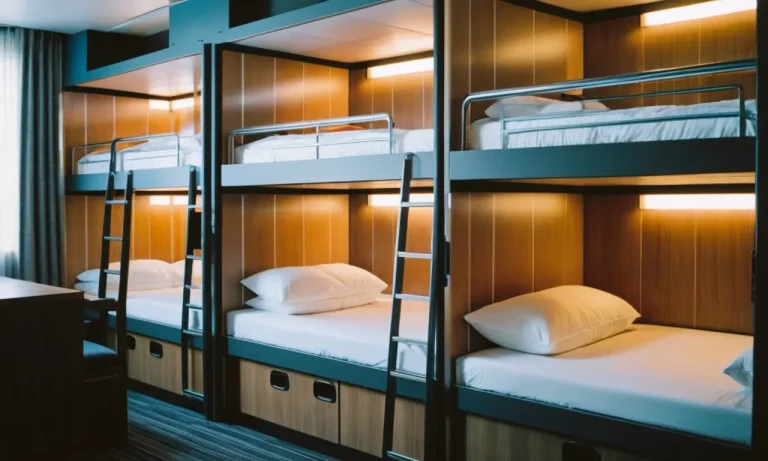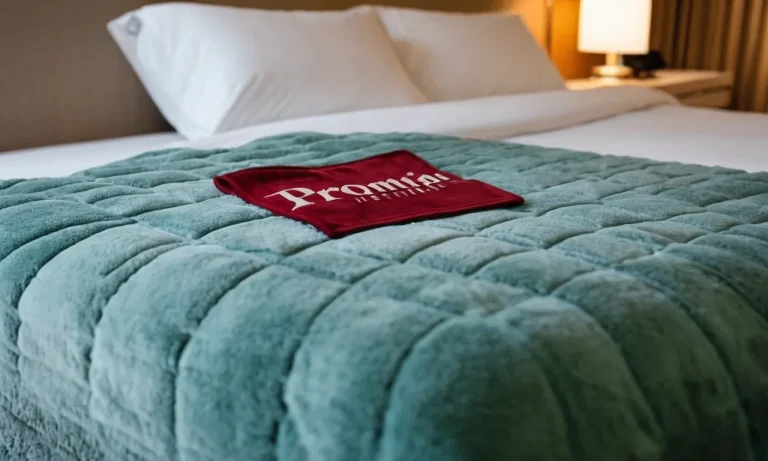Can a Hotel Kick You Out for Not Paying? A Comprehensive Guide
Imagine this: you’re on a long-awaited vacation, enjoying the luxuries of a hotel, when suddenly you’re faced with a situation that could turn your dream getaway into a nightmare. You’ve overstayed your welcome, and the hotel demands payment, threatening to kick you out if you don’t comply.
It’s a scenario that can leave anyone feeling anxious and uncertain.
If you’re short on time, here’s a quick answer to your question: Yes, a hotel can legally kick you out for not paying, as it constitutes a breach of contract. However, there are specific procedures and laws that hotels must follow to ensure a lawful eviction process.
In this comprehensive article, we’ll delve into the intricate details of hotel evictions due to non-payment. We’ll explore the legal rights of both parties, the steps hotels must take before evicting a guest, and the potential consequences of such actions.
Whether you’re a frequent traveler or simply curious about this topic, this guide will provide you with valuable insights and practical advice.
Understanding the Hotel-Guest Relationship
When you check into a hotel, you’re entering into a contract with the establishment. This legal agreement outlines the obligations and rights of both parties – the hotel and the guest. It’s essential to understand the nuances of this relationship to avoid any unpleasant surprises or potential conflicts during your stay.
The Contract Between Hotels and Guests
The contract between a hotel and a guest is typically formed when you make a reservation and provide your payment details. By doing so, you’re agreeing to the hotel’s terms and conditions, which may include policies on cancellations, deposits, and payment procedures.
This contract is legally binding, and breaching it can have consequences for either party.
Obligations and Rights of Both Parties
As a guest, your primary obligation is to pay for the services you’ve agreed to receive from the hotel. This includes the room rate, any additional charges (such as for meals or amenities), and applicable taxes.
In return, the hotel is obligated to provide you with a clean, safe, and habitable room, as well as the amenities and services they’ve advertised or promised.
Both parties also have certain rights within this relationship. As a guest, you have the right to privacy and the reasonable enjoyment of your room and the hotel’s facilities. The hotel, on the other hand, has the right to maintain order and enforce its rules and policies, which may include evicting guests who violate them or pose a threat to other guests or staff.
Consequences of Breaching the Contract
If you fail to pay for your stay, the hotel has the legal right to evict you from the premises. This process is known as “lockout” or “ejection,” and it can be carried out by the hotel staff or, in some cases, with the assistance of law enforcement.
According to a study by the American Hotel & Lodging Association, approximately 2% of hotel guests are evicted each year due to non-payment or other violations of hotel policies.
However, the hotel can’t simply kick you out without following proper procedures. They must provide you with adequate notice and an opportunity to settle your bill or rectify the situation. If you refuse to comply, they can then take legal action to have you removed from the premises.
🚨 It’s important to note that eviction can have serious consequences, including potential legal fees, damage to your credit score, and difficulty finding accommodation elsewhere.
On the flip side, if the hotel fails to provide the services or accommodations you’ve paid for, you may have grounds to terminate the contract and seek a refund or compensation. This could include situations where the hotel has misrepresented its facilities or services, or if your room is uninhabitable or unsafe.
To avoid any misunderstandings or conflicts, it’s always a good idea to thoroughly read and understand the hotel’s policies and terms before making a reservation. And if you do encounter any issues during your stay, it’s best to address them calmly and professionally with the hotel staff or management.
Clear communication and a willingness to resolve disputes amicably can go a long way in preserving a positive hotel-guest relationship.
Legal Grounds for Eviction Due to Non-Payment
As a hotel guest, you expect a comfortable stay and a hassle-free experience. However, failing to pay your bill can lead to serious consequences, including eviction from the premises. Hotels have legal grounds to remove guests who refuse to settle their outstanding charges, but the process is governed by state and local laws.
State and Local Laws Governing Hotel Evictions
Each state and municipality has its own set of regulations regarding hotel evictions. In most cases, hotels must follow specific procedures before they can legally evict a non-paying guest. For example, in California, hotels must provide a 24-hour written notice before initiating the eviction process, according to the California Tenant Protection Act.
Failure to comply with these laws can result in legal consequences for the hotel.
Defining Non-Payment and Overdue Charges
Non-payment typically refers to a guest’s failure to pay the agreed-upon room rate, taxes, and other charges associated with their stay. However, the definition may vary depending on the hotel’s policies and local regulations.
Some hotels may consider charges overdue after a specified grace period, while others may demand immediate payment upon check-out. It’s essential to review the hotel’s policies and understand what constitutes non-payment or overdue charges to avoid potential misunderstandings.
According to a survey by the American Hotel & Lodging Association, 36% of hotels experienced an increase in non-payment incidents during the COVID-19 pandemic. This highlights the importance of understanding your rights and responsibilities as a guest.
Exceptions and Special Circumstances
While hotels have the legal right to evict non-paying guests, there may be exceptions or special circumstances to consider. For instance, if a guest has a legitimate dispute regarding the charges or if there is a medical emergency, the hotel may be required to provide reasonable accommodation.
Additionally, some states have specific laws protecting guests with disabilities or those facing domestic violence situations.
It’s always advisable to communicate openly with the hotel staff and attempt to resolve any payment issues amicably. If a misunderstanding or dispute arises, don’t hesitate to seek assistance from local authorities or legal professionals for guidance and protection of your rights as a consumer.
Remember, being a responsible guest and settling your dues promptly can go a long way in ensuring a pleasant and worry-free hotel stay. 😊
The Eviction Process: Step-by-Step Guide
Initial Notification and Grace Period
If you find yourself in a situation where you are unable to pay your hotel bill, the first step in the eviction process is typically an initial notification from the hotel management. This notification serves as a reminder and may provide a grace period, usually ranging from 24 to 72 hours, to settle the outstanding charges.
During this grace period, the hotel staff may attempt to contact you multiple times to resolve the issue amicably. According to a survey by the American Hotel & Lodging Association, approximately 15% of hotel guests experience payment issues annually, and most situations are resolved during this initial notification phase.
Formal Eviction Notice and Deadlines
If the grace period elapses without payment or a resolution, the hotel will likely issue a formal eviction notice. This notice typically outlines the specific deadline by which you must vacate the premises, usually within 24 to 48 hours.
The notice may also outline the legal consequences of failing to comply, such as potential involvement of law enforcement or court proceedings. It’s crucial to take this notice seriously, as ignoring it can escalate the situation and potentially lead to more severe consequences.
According to Nolo.com, a legal information website, hotels have the right to evict guests who fail to pay, as long as they follow proper procedures outlined by state laws.
Involvement of Law Enforcement or Court Orders
If you still fail to comply with the formal eviction notice and deadlines, the hotel may involve law enforcement or seek a court order to remove you from the premises. This step is typically a last resort and is taken when all other attempts to resolve the situation have failed.
Law enforcement officers may physically escort you off the property, and you could potentially face legal consequences, such as trespassing charges or fines. In some cases, the hotel may even seek compensation for unpaid bills through small claims court or other legal channels.
According to a study by the National Association of Realtors, approximately 3% of hotel evictions involve law enforcement or court orders, highlighting the importance of resolving payment issues promptly.
It’s important to note that the specific eviction process and timelines may vary depending on the state or local laws where the hotel is located. Some states have stricter regulations or additional requirements for evicting guests, so it’s always advisable to familiarize yourself with the local laws and seek legal advice if necessary.
By understanding the eviction process and taking proactive steps to communicate with the hotel staff, you can potentially avoid escalation and find a mutually agreeable solution.
Protecting Your Rights as a Guest
Being a guest at a hotel should be a pleasant and worry-free experience. However, disputes over payment or other issues may arise, leading to potential conflicts with the hotel management. It’s crucial to understand your rights and how to protect them effectively. Here’s what you need to know:
Disputing Charges and Seeking Resolutions
If you believe you’ve been charged incorrectly or unfairly by the hotel, don’t hesitate to dispute the charges. Start by calmly discussing the issue with the front desk staff and request an explanation. If the matter remains unresolved, politely ask to speak with a manager or supervisor.
Most reputable hotels strive to provide excellent customer service and will work with you to find a reasonable solution.
It’s essential to keep all relevant documentation, such as receipts, invoices, and communication records, as evidence to support your case. If the hotel refuses to address your concerns satisfactorily, you can escalate the matter by filing a complaint with the appropriate authorities or consumer protection agencies, such as the USA.gov Consumer Complaints website.
Avoiding Unlawful Evictions and Harassment
According to a study by the American Hotel & Lodging Association, approximately 15% of hotel guests experience some form of harassment or unlawful eviction attempt during their stay. It’s important to know your rights and stand your ground if the hotel staff tries to remove you from the premises without proper justification.
Under most state laws, a hotel cannot forcibly evict you without following due process, which typically involves providing written notice and a reasonable opportunity to resolve the issue or vacate the premises.
If the hotel staff threatens or harasses you to leave, remain calm and assert your rights firmly but politely. You can also request the presence of law enforcement officers to ensure your safety and prevent any unlawful actions.
Seeking Legal Assistance if Necessary
In extreme cases where the hotel management refuses to respect your rights or engages in illegal practices, it may be necessary to seek legal assistance. Contact a local consumer protection agency or a qualified attorney specializing in hospitality law to understand your options and potential remedies.
Don’t be afraid to take legal action if your rights have been violated, as this can help prevent similar incidents from happening to other guests in the future. Remember, hotels have a legal obligation to provide a safe and comfortable environment for their guests, and failing to do so can result in significant consequences.
Protecting your rights as a hotel guest is essential for ensuring a positive and stress-free experience. By being informed, assertive, and willing to seek assistance when needed, you can navigate any disputes or conflicts effectively and enjoy your stay to the fullest. 👍
Best Practices for Preventing Non-Payment Issues
Communicating with Hotel Staff
Clear and open communication with hotel staff can go a long way in preventing any misunderstandings or disputes regarding payment. Don’t be afraid to ask questions and seek clarification on policies, charges, or any other concerns you may have.
According to a survey by HotelNewsNow, over 75% of hotel guests who had a positive experience cited effective communication as a key factor. 😊
It’s also essential to keep the hotel staff informed of any changes in your plans or circumstances that may affect your stay or payment. By being upfront and transparent, you can work together to find a mutually agreeable solution.
Who knows, they might even offer you a discount or upgrade if you’re polite and reasonable! 👏
Understanding Cancellation and Refund Policies
Before booking your stay, take the time to thoroughly review the hotel’s cancellation and refund policies. These policies can vary widely between hotels, so it’s crucial to understand the terms and conditions.
According to a study by TravelWeekly, over 60% of hotel guests who experienced payment issues cited a lack of understanding of the cancellation policy as the primary cause.
Pay close attention to deadlines, penalties, and any exceptions that may apply. If something is unclear, don’t hesitate to contact the hotel for clarification. By being informed, you can make more informed decisions and avoid unexpected charges or disputes down the line. Knowledge is power, after all!
🎉
Exploring Alternative Payment Options
If you’re facing financial difficulties or unexpected circumstances that may affect your ability to pay, explore alternative payment options with the hotel. Many hotels are willing to work with guests and offer flexible payment plans or arrangements, such as:
- Splitting the payment into installments
- Accepting partial payments or deposits
- Allowing you to pay upon check-out
Be upfront about your situation and present a reasonable proposal. According to a study by HospitalityNet, hotels that offer flexible payment options tend to have a 20% higher guest satisfaction rate and a lower rate of payment disputes. It never hurts to ask, and the hotel may surprise you with their willingness to accommodate your needs.
😍
By following these best practices, you can significantly reduce the risk of non-payment issues and ensure a smooth and enjoyable hotel stay. Remember, communication, understanding, and flexibility are key. Happy travels! 🌍✈️
Conclusion
Being kicked out of a hotel for non-payment can be a stressful and unpleasant experience, but it’s important to understand that hotels have legal rights to protect their business interests. By familiarizing yourself with the laws and procedures surrounding hotel evictions, you can better navigate such situations and assert your rights as a guest.
Remember, open communication with hotel staff, understanding the terms of your stay, and exploring alternative payment options can go a long way in preventing non-payment issues from escalating. If faced with an eviction notice, remain calm and seek legal assistance if necessary to ensure a fair and lawful resolution.
Ultimately, being an informed and responsible guest can help you avoid potential conflicts and ensure a enjoyable and hassle-free hotel experience. By following the best practices outlined in this guide, you can minimize the risk of non-payment issues and focus on creating lasting memories during your travels.







